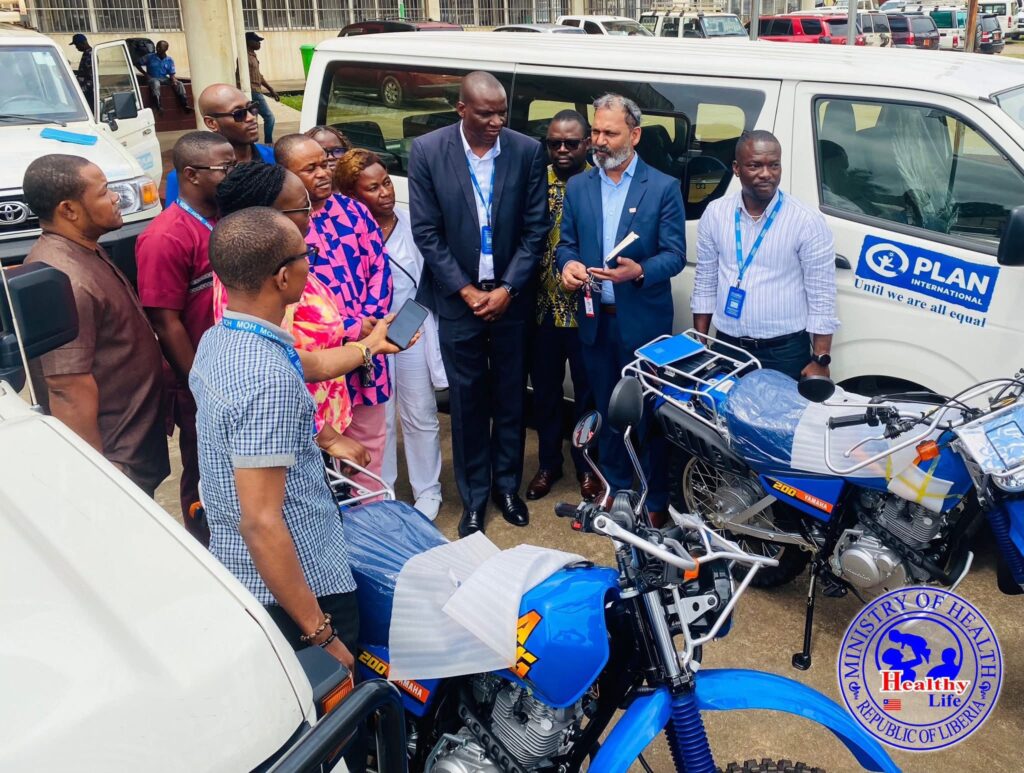The Ministry of Health (MOH) has received a fleet of motorbikes and vehicles from Plan International, aimed at enhancing Liberia’s healthcare delivery, particularly in the ongoing response to COVID-19. The donation, facilitated under the Global Fund’s COVID-19 Response Mechanism (C19RM), is part of broader efforts to improve access to healthcare services across the country.
Health officials highlighted that the vehicles and motorbikes will significantly improve mobility for healthcare workers, enabling them to reach remote communities, deliver essential medical supplies, and conduct timely health interventions. This development is especially critical in rural areas where transportation challenges have historically hindered effective healthcare delivery.
“These vehicles will strengthen our health system by ensuring that health personnel can respond quickly to emergencies, transport vaccines, and monitor disease outbreaks efficiently,” said an MOH spokesperson.
The donation underscores Liberia’s commitment to strengthening health system resilience. Motorbikes, in particular, provide flexibility for healthcare workers to navigate difficult terrains and reach underserved populations, while the vehicles allow for bulk transport of medical supplies and rapid response to emerging health crises.
According to the World Health Organization (WHO), access to reliable transportation is a critical factor in reducing delays in care and improving health outcomes in low-resource settings. By providing these vehicles, Plan International and the Global Fund directly contribute to improving maternal and child health, vaccination campaigns, and infectious disease management in Liberia.
Global Fund C19RM Support
The donation falls under the COVID-19 Response Mechanism (C19RM), which aims to strengthen the capacity of health systems to manage pandemic-related challenges while maintaining essential health services. Liberia has been actively using C19RM resources to expand testing, vaccination, and community outreach programs, and the addition of this transport fleet is expected to enhance the operational efficiency of these initiatives.

Data from Liberia’s Ministry of Health indicate that over 40% of rural health facilities face challenges related to transportation, affecting routine immunization, disease surveillance, and emergency response. The infusion of motorbikes and vehicles is expected to reduce delays in patient care, improve coverage of immunization programs, and enhance monitoring of COVID-19 and other infectious diseases.
Healthcare experts note that sustainable improvements in the healthcare system require not only medical supplies but also logistical infrastructure. “Without mobility, even well-equipped health facilities cannot function optimally,” said Dr. Emmanuel K. Yarkpawolo, Executive Director of EPA, drawing parallels to the importance of system-wide support in service delivery.
The MOH has pledged to ensure the proper management and strategic deployment of the vehicles and motorbikes to maximize impact. Training programs for health workers on effective use, maintenance, and deployment are expected to follow, ensuring long-term benefits for the health system.
This collaboration between Plan International, the Global Fund, and the MOH exemplifies how targeted support in logistics and infrastructure can strengthen healthcare resilience, improve service delivery, and enhance Liberia’s preparedness for current and future health challenges.





